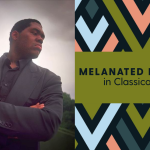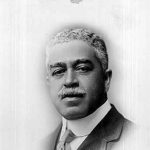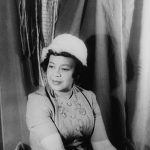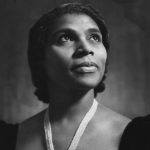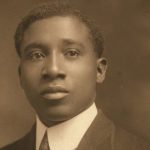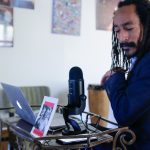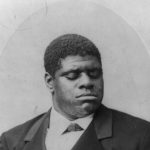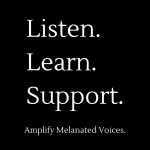Melanated Moments, S1E6: Opera from a Sistah’s Point of View
In this episode, Angela walks us through her storied career and shares some of her favorite performances with the help of her long-time friend, Janet Jarriel.
Featured Music:
“Ciel mio padre” from Aida (Act III) by Giuseppe Verdi, performed by soprano Angela Brown, baritone Gregg Baker, and Opera Philadelphia
The theme song from UCNF, performed live by Angela Brown in “Opera…from a Sistah’s Point of View”
Music Plays (00:05): [MMCM Theme] Joshua Thompson (00:15): Welcome back. I’m Joshua Thompson…. Angela Brown (00:17): And I’m Angela Brown. Unison (00:18): And this is Melanated Moments in Classical Music. Joshua Thompson (00:24): Angela, I’ve known you for a while. Angela Brown (00:27): Yes… Joshua Thompson (00:27): Few years. And um, if there’s one thing I know about you, it’s that a lot of people know you, but you don’t really toot the horn. You’re big on the humble brag, right? Angela Brown (00:41): Oh, Joshua… Joshua Thompson (00:41): See, that’s what I’m talking about– big on the humble brag– cause the answer to the question was “Yes”! But what I want to do– or what we are going to do– with this episode is really special is: it’s not every day that we get an opportunity to listen to individuals who’ve had a huge impact and continue to make a big impact on the world of classical music, and you are one of those people, not just for me, but for so many folk. Cause I’m going to tell you straight up, growing up here in Indianapolis, I love this city, but there’s not a lot of us when it comes to the classical arts. I’m a trumpet player and a pianist, and I can count on one hand how many times I have seen us in an orchestra. Angela Brown (01:20): Yeah, that’s true. Joshua Thompson (01:21): And it leaves us wanting, and it kind of leaves us wondering, “Well is this–“ Angela Brown (01:23): -In classical music– Joshua Thompson (01:25): In classical music, for sure. I’d like to make that distinction. It leaves us wondering sometimes: are we meant to do this? Is this something I’m supposed to do? And if the answer is yes– which it always is– Angela Brown (01:34): Yes! Joshua Thompson (01:35): –Well, who do we look to? Where do we go? How do we figure out what the ropes are? And you’re sitting right here! So, ready or not, you are our subject for Mela– Angela Brown (01:47): I got next! Joshua Thompson (01:47): You got next! — for Melanated Moments. And I’m also really excited because, to kind of tell this entire story, you brought in your agent! Angela Brown (01:53): Well not on purpose, not on purpose! Uh, Janet and I have been working together on a handshake agreement since 1996, and she just happened to be in town when we were doing this podcast– Joshua Thompson (02:09): Well lemme– Janet, welcome! Janet Jarriel (02:10): Oh, thank you for having me. Joshua Thompson (02:13): How are you? Janet Jarriel (02:15): I am great. Glad to be back in Indianapolis. Joshua Thompson (02:18): It’s not bad of a city. It’s a little rainy, but you know, it’s still alright. Janet Jarriel (02:22): Oh, I love Indianapolis! Joshua Thompson (02:23): Good! Now, you drove all the way from… Janet Jarriel (02:24): Nashville, Tennessee. Angela Brown (02:27): That’s right! Joshua Thompson (02:27): So we’re going to trace all this together between myself and Angela and Janet and Nashville, in just a bit. But first, I kind of want to lay the groundwork and just figure some things out. Let’s get to know the life and times of the legendary Angela Brown– Angela Brown (02:41): Oh please, come on now! [laughter] Joshua Thompson (02:42): I’m just– see, you humble brag, and I’ma lay it out there for the folks. Angela Brown (02:46): Okay! Joshua Thompson (02:47): Let’s start from the beginning. Angela Brown (02:48): Wow. There’s a lot! Well, I was born and raised here in Indianapolis, Indiana. My grandfather was a Baptist minister. My father, uh, worked at Chrysler, and my mother was a nurse and then– she was also a singer and an artist. And I got the singing and my brother– my oldest brother, George got the art. But how I got into music: I always say that I sang for the opening of an envelope when I was here in Indianapolis. If there was an event that was going on that– they needed a vocalist– they called me, and I did a lot of musical theater here in Indianapolis and civic theater. I sang all through high school at Crispus Attucks High School. So I’ve always been performing. Joshua Thompson (03:32): You come from that lineage of Crispus Attucks. For those of you who don’t know, it was like the school that you went to, if you were Black growing up in Indianapolis. That’s where you went. Angela Brown (03:41): If you were Black, that was the school you went to. Joshua Thompson (03:43): And a ridiculous amount of phenomenal musicians and artists came out of that program, correct? Angela Brown (03:48): Exactly. And we had very good professors and teachers because those people, that were so learning and so prolific in whatever genre or career, if they were African American, the best of– the cream of the crop was teaching at Crispus Attucks High School. So it just went to show that anybody that the greats were teaching, were going to make great students. And that’s what came out of Crispus Attucks– Joshua Thompson (04:14): And they did. Angela Brown (04:14): Yea!– To jump forward, when it came to classical music, I always say that opera chose me– I didn’t choose it. Joshua Thompson (04:23): Were you resistant to opera? Angela Brown (04:25): Well, you know, I definitely had been exposed to it because in grammar school, at that time we had field trips, and we went to the opera and we went to the symphony and the ballet. That’s what was happening back when I was in school– now, not so much now. But I didn’t think I could see myself as a classical singer, a soprano, a screechy soprano, you know– Joshua Thompson (04:51): Wha– screechy soprano? Angela Brown (04:51): I say screechy because I couldn’t relate. Because my diet, in my home– my mother, on Saturday mornings, turned the big-piece-o-furniture stereo on, we were dustin’ to “Barefootin”. [sings] And then listening to some of her old 78s, you know, and listening to Earth, Wind and Fire and Stevie Wonder and– Joshua Thompson (05:15): I feel like we grew up in the same house! Angela Brown (05:18): Yeah! And so that’s what we heard in the house. And then she would take us to Starlight Musicals, and we would watch all these different musicals that were come through Indianapolis– or be performed by locals here in Indianapolis– and then she would take us to Sam’s Subway and get us a corned beef sandwich with a pickle! Okay. I want a egg roll! I remember that. Joshua Thompson (05:40): You lived for that, didn’t you? Angela Brown (05:40): Yes, I lived for that– Joshua Thompson (05:40): Ah, I love it! Angela Brown (05:42): But like I said, opera chose me. I didn’t choose it. I ended up going to Oakwood University in Huntsville, Alabama, and started to study with my teacher, Ginger Beasley there. And I started off as a mezzo- soprano. And she was also a student of Virginia Zeani, that was at IU (Indiana university). Well, once Mrs. Zeani heard me sing, she said, “Angela is not a mezzo-soprano! She is a dramatic soprano– the blood of Verdi courses through her veins.” Then she looks at me and she says, “Darling, when you are done with Ginger, you come to me– I take you in my studio.” Joshua Thompson (06:25): How do you respond to that? Took yourself to– Angela Brown (06:27): I brought my– took myself to IU! Now I will say: once I got to IU, I thought I was going to be a little fish in a big pond, but opportunities opened up for me quickly there. Joshua Thompson (06:41): How so? Angela Brown (06:42): I just think it was my time. Joshua Thompson (06:44): Fair enough. Angela Brown (06:45): I have always said– especially to singers that are working so hard to have this career and they feel like they’re just spinning their wheels and they’re not getting anywhere– I say you just have to be patient, keep yo’ head down, keep yo’ nose clean and just do good work. And I felt like I was doing good work and making myself prepared for opportunities that have not presented themselves to me. Joshua Thompson (07:13): Whether you knew they’re out there or not, the work is out there and– Angela Brown (07:15): Exactly! It’s what I wanted to do. Joshua Thompson (07:17): –the work is what matters– Right on, yeah. Angela Brown (07:18): It was what I wanted to– I was too stupid to stop. I just kept doin’ it. And, uh, opportunities just came to me, and I ended up going around with the Dean of the School of Music, Charles Webb. When I auditioned for their cattle call auditions to be put in all the different operas there for the year, I was number 120. I sang Vissi d’arte. They taped those cattle call auditions that day. Janet, my agent, actually taped those auditions– Janet Jarriel (07:50): I played them back for Dean Webb! Angela Brown (07:52): Oh, you played the– you were the one! Janet Jarriel (07:54): I played them back for– I would sit in his office and he would say “Next”, and we’d fast forward to the next thing. And then I was– yeah. So, go ahead. Angela Brown (08:03): Why were you in Dean Webb’s office? Joshua Thompson (08:04): I was gona say– Unison (08:04): [laughter] Janet Jarriel (08:07): He asked me if I wanted to come in and help, so– I loved watching those cattle calls! So I was working the machine, yeah. Angela Brown (08:16): And so then what– the way the story has been told to me is that– he was filling out some paperwork, and then he heard my voice and he looks up and he yells to Pam, his secretary and says, “Who’s that?” And she said, “Oh, that’s number 120”. He was like, “I can see it’s number 120, but who’s that–“ Joshua Thompson (08:33): But what is her name? Angela Brown (08:34): She was like, “Oh, Angela Brown”. Well, Indiana University has very experienced, famous teachers, and one of them– the one teacher that he was working with– fell ill, and he had to do this concert. And he said, “Get Angela on the phone”. And so they called me up. She couldn’t do it. He asked if I could come and do it, pull together, you know, a few songs– he would play some stuff, and then I would sing what I knew, you know? And that would be the concert. And I remember the first one was at the Honeywell House. I remember standing in that living room– and they had chairs, you know, all around, and when I stood at– in the crook of the piano– the next person’s knees were like, right there! This was the closest, smallest– Joshua Thompson (09:20): The most intimate of all intimate– Angela Brown (09:20): Intimate, yes! Joshua Thompson (09:23): Nerve-wracking? Angela Brown (09:23): Nerve-wracking! Joshua Thompson (09:25): I’m sure. So you have those, those opportunities that continue at IU. You’re, you’re getting this glimpse of what it can be like, wetting your appetite just a little bit for this. How do you go from that– those intimate opportunities where you’re getting a glimpse– to actualization? Angela Brown (09:41): Wow, that’s a good question. And I’ll answer it this way–and I’ve already said it: I was too stupid to stop. I just kept going, and I always was looking for opportunities for myself. Going from IU, I did a lot of creative planning. I was at IU and had to go to New York to sing in a competition– Janet Jarriel (10:06): Is this the– Angela Brown (10:07): Yes. Janet was pregnant. She was my agent by then, because– let me go back a little bit. So after I met Janet and I had gone out to California, I had a week of residency at Stanford University, and I met a lady by the name of Helen Bing. And she was one of the benefactors of Stanford University’s musical programming there– Janet Jarriel (10:32): Actually of all of Stanford– Angela Brown (10:35): Well there you go– Of all of Stanford University! Joshua Thompson (10:38): So you were rubbin’ the right elbows! Angela Brown (10:42): Well, I was rubbin’ the right elbows! Janet Jarriel (10:43): –amazing woman. Angela Brown (10:44): Yes, definitely. And so she was actually– she heard me sing. She asked me, “Do you have a CD?” I was like, “No, ma’am I don’t.” I was like, “No, I don’t have any money to be doing a CD.” I was still in school. And she says, “Well, I’m going to go away for the month of February, and when I get back, I will send a check so that you can start doing a CD”. Joshua Thompson (11:02): Oh, wow– Angela Brown (11:03): –with Dean Webb– Joshua Thompson (11:03): Just like that. Angela Brown (11:04): Just like that! And I think in May, Dean Webb called me up, said, “Angela, I have a check here, sitting on my desk from Helen being, we have to do a project.” And so that was my first project, and Ms. Janet Jarriel was the producer of that project. And so that’s how we– and I went to her soon after, because remember Janet said she was doing her master’s at– in arts administration. So she was learning to be a manager, and I said, “Well, why don’t you manage me? “She said, “I thought you would want some big management in New York. I said, “If it’s not broke, why fix it? It seems like it’s the same thing. You seem to be connected. Let’s get this…shiggity goin’!” Unison (11:41): [laughter] Joshua Thompson (11:43): So Janet, this was back in ’96? Janet Jarriel (11:47): Yes! Well, we made the demo CD in ’95. Joshua Thompson (11:52): So let’s talk about this career, that Angela, that you have, that Janet you are in partnership with as well. For me, I remember, I distinctly remember Angela, reading in newspapers and seeing on the news that you’re at the Met. This is in 2004. You’re at The Metropolitan Opera– not just in any role, not just on the stage– commanding the stage as Aida. So how does that happen? Where does that partnership go from making demos to, all of a sudden, “We’re at The Met”? Angela Brown (12:22): Wow, Janet? Janet Jarriel (12:24): I’m going to go back to what Angela has already said– Joshua Thompson (12:27): Too stupid to stop, huh? Janet Jarriel (12:29): –too stupid to stop, both of us, a lot of times, not knowing what we were– Angela Brown (12:33): What the heck we were doing– Janet Jarriel (12:35): –was actually a blessing. Angela Brown (12:37): Yes. Janet Jarriel (12:38): And I’m going to say this: because we are nice people with integrity– Angela Brown (12:45): Yes, and being kind goes a long way. Joshua Thompson (12:47): It really seems like it. this is an industry– for any way that you want to divvy it out– it seems super cutthroat. It seems very heartless. It seems very cold and so it almost– Angela Brown (12:56): And what you seen, is what you get. It’s the truth. Joshua Thompson (12:59): Yeah! So The Met with Aida happens. And so, and again, what’s next? Angela Brown (13:03): Well, you know, that’s a big jump– Joshua Thompson (13:06): It is a huge jump, it is! Angela Brown (13:07): — because there’s a whole lot that happened between IU and The Metropolitan Opera. Janet Jarriel (13:13): And from The Metropolitan Opera, til now! Joshua Thompson (13:16): Right. Angela Brown (13:16): Because I would not want anyone to think that that’s–it was an easy win. It was not an easy win, but when you are too stupid to stop, you don’t know how hard you’re working and you are having a great time doing it. Joshua Thompson (13:29): So that’s the important part too. Angela Brown (13:30): That’s an import– You have to enjoy it! Joshua Thompson (13:36): That’s a motto I can definitely get behind. Janet Jarriel (13:37): But be prepared– Unison (13:38): But be prepared for that! Angela Brown (13:39): It’s about being prepared with no opportunity, then to have the opportunity– Unison (13:43): and not be prepared. Joshua Thompson (13:44): My parents used to say that all the time, and they still do. They still do. Angela Brown (13:47): Yeah, And so after four tries, the Metropolitan says, “Come and audition for main stage– doing that, becoming a cover after becoming a cover, becoming a cover, but– where you are sitting backstage waiting for any opportunity to jump in”. I was never plotting anybody’s demise– trying to slip him a little Tryptophan Turkey sandwich, which would make ’em look a lil sleepy and they can’t go out and sang– No, I never, never even thought that. I want everybody to have their opportunities because I felt like mine was coming. And then having that call to come and being prepared for that opportunity– ready. Because it came in the form of a rehearsal where the soprano got sick. Then I sang that Aida, did a cover Aida that afternoon, got on the train, rode 45 minutes back to my home in the Bronx, turned on my phone, and Janet yelling in the phone, “Angela!– What did you do? The Metropolitan Opera just called and offered you a contract for 2004, where you will have your debut built in. Joshua Thompson (14:55): Wow. Angela Brown (14:55): “What did you do?” So, yeah, I was just– I wa’ workin’! Joshua Thompson (15:00): She said “I did Angela!” You did what you did, yeah. Angela Brown (15:02): So I went from covering at The Met, to singing at The Met, to singing on the stages of the world. Joshua Thompson (15:06): Right. So, I don’t think we had that specific performance at The Met, but we do have a recording from your performance with– I believe it’s Greg Baker in Philadelphia. Music Plays (15:20): [“Aida,” performed by Angela Brown and Greg Baker] Joshua Thompson (16:37): So most, definitely, at last and Aida. Right? Probably one of the highlights, I’m sure, right? Angela Brown (16:44): Oh, definitely. Joshua Thompson (16:45): So from there, where did you– where did you go from there? How did you continue to evolve as an artist and shape your role? Angela Brown (16:53): Well, things got crazy. I started singing– you know, you, you become an artist and you become that– You get on that train. Joshua Thompson (17:02): Overwhelmingly crazy or a good crazy? Angela Brown (17:05): Uh, both– both because you’re going from city to city, score to score, role to role, old and new, and then still trying to have a life. During that time, I met and married my husband. I buried both of my parents. I had a couple of dogs. Right. You know, um, life– life happens. And someone said to me, “Well, how do you deal with, you know, losing your parents on the road” or whatever. I was like, “It’s life.” You know, my parents– when they were both in hospice– they said, “Angie, we don’t want you to come off the road because all you’re going to do is come here and sit and look at us– Joshua Thompson (17:44): and stay. Angela Brown (17:45): –and stay. We want you to keep it moving.” So when both of my parents, I was singing and I just came off the road, did what I– pay my respects, did what I had to do. I was able to spend time with them, a little bit, and then got back on the road because that’s what they worked so hard– Unison (18:03): for me [you] to be able to do! Angela Brown (18:04): Yeah. So, I couldn’t– disappoint them. So I– kept movin’. And of course, I’ve had to deal with, um, the grief of that. And it does show up. You have to take time for yourself. And I remember it showing up when I was doing “Il Trovatore,” uh– Janet Jarriel (18:22): Atlanta. Angela Brown (18:24): In Atlanta, and I was working with Maestro Eduardo Mueller. Oh, I call him my Maestro Granddaddy. He has passed on now, since then. But I couldn’t get this one Aria together, “Tu ve drie”, which is, I think, just Verdi, just– Joshua Thompson (18:41): Bein’ a nut. Angela Brown (18:44): Bein’ a nut and having too many things to say the same thing. And I couldn’t get it together. They had decided to open that cut. And this is another, uh, lesson: all singers, learn the whole score, regardless if they say they’re going to cut it. Cause baby, when they opened a cut and you don’t know what that music– you in them practice rooms, learning it before you got to go on. So that’s what had happened to me, and I was just overwhelmed. I was overwhelmed, but life happens and you just keep it rolling. And then you start to think beyond the career. Actually, early on, Janet and I– she was pregnant with her first baby. She was married to Malcolm and we were in their car, driving from Bloomington– Janet Jarriel (19:30): The big ol’ Oldsmobile! Angela Brown (19:30): Yeah! –Bloomington, Indiana to New York City. Joshua Thompson (19:32): Oh, my gosh, what a drive– Angela Brown (19:33): So that I could sing– yeah, it was crazy. Janet Jarriel (19:36): None of us had any money! Angela Brown (19:39): Yeah, we had to get there! You do what you have to do. We’re building, okay. Joshua Thompson (19:42): Yes, you do, every time– Angela Brown (19:42): And that’s the passion part. I was willing to do whatever I had to do to get where I am today and beyond. Cause I’m still on that kind of grind. But I knew that there was going to come a time when the opera houses wouldn’t gone checkin’ for me, and when I was– to be very honest with you, they weren’t checkin’ for me thenO I was preparing for my Outro before my Intro, okay. Joshua Thompson (20:06): Smart. Angela Brown (20:07): And that is one thing I would also tell students: always start looking at your second act before you even get into your first act, so that you can have something to go towards. So when the opera companies are not checkin’ for you, you can hire yourself! I created the show, Opera, from a Sistah’s Point of View, and that was in the back of Janet’s Oldsmobile. It was the, um– Joshua Thompson (20:33): Oh, when you guys are driving from Bloomington to– Janet Jarriel (20:35): Yeah! Yeah. We sat in the back seat and we just kept– we had a notebook, an old fashioned notebook and– Unison (20:42): Scribbled it all out. Angela Brown (20:43): –and got it all out and start– Joshua Thompson (20:45): Genius, so smart– Angela Brown (20:45): –and talking about it and thinking about the vignettes and how we would do it and yada yada. And it had gotten to a point where it had stalled, and I didn’t quite know how to do it. Cause you know how you want to do something, but you know, it’s that– Joshua Thompson (20:59): It’s that hump! You gotta get over, just a little bit– Angela Brown (20:59): And it’s like, “Oh, I’m scared, I’m scared, I’m scared.” And something said, “Just do it”. And I did a concert and I–I was just me. I was just me, and it works. I mean, that’s just the truth. So I started Opera from a Sistah’s Point of View, out of sheer necessity, because I wanted to be able to work between gigs. Then it became a big fish in a big pond. Joshua Thompson (21:23): It really did. Cause I mean, it’s gotten– and since, it continues. So, it definitely still plays here in Indianapolis. You just recently did one, I think towards the end of 2019, that went over very, very well. I’ve seen you in interviews about it on CNN, on other major national outlets. So this idea that you both had– thinking of your second act, you know, before the first round starts– on this cross country trip from Bloomington to Buffalo clearly resonates, uh, not just for the works themselves, but even how to think about a career completely– Right? Angela Brown (22:03): Exactly. And what Opera from a Sistah’s Point of View does is: to demystify opera for audiences that normally wouldn’t go. And I thought that– because I was singing on stages of the world, looking out in the audience, I saw very few people that look like me. And so I thought it was a black thing. I started doing Opera from a Sistah’s Point of View, found out: Oh, white folks don’t like opera either! It’s about being exposed. Joshua Thompson (22:28): It is. Angela Brown (22:28): It’s about knowing. And if you know, then you can grow. But if you don’t know– if you don’t know you like a mushroom, don’t be talking about, you don’t want to eat it, try it! Unison (22:41): Then you can form your opinion! Joshua Thompson (22:44): And that’s the key to it: it’s accessible. Classical music, in general, I think kind of– we have to strip away this assumed elitist-ism from it and be like, “Hey, it’s just music. It’s just fun. We all like it”. So, we actually have a clip from your show that we’re going to play, not just to give people an understanding of what opera is like, but how do you actually begin to engage an audience, so that they can know that opera is accessible and fun and doesn’t have to be so high brow and boring. Angela Brown (23:15): [recorded audio] You know, I began to learn about classical music when I was in school. And I also remember– anybody remember, oh, in the late– mid seventies, mid seventies, School House Rock on Saturday mornings: “Conjuntion junction, what’s your function”! And then sometimes, that Saturday morning, you would see a beautiful African-American woman come on, singing a song about the United Negro College Fund. Can anyone tell me who that was?–Leontyne Price! [sings] “Reaching for the dreams that spell Tomorrow, another generation a-comin on. I see America working harder every day, to educate her people, to live a better way. Now, wouldn’t you like to feel another shoulder at the wheel? If you help me tow the line, you’ll pull your weight and I’ll pull mine! We want to give our best, please understand! We’re not asking for a hand-out, just a hand! –Honey! Baby, you could find me any Saturday morning, running around the house, singing high notes, like Leontyne Price. And I never knew that I had that dream to be an opera singer. I just wanted to be a singer, but it wasn’t until, like I said, I started to study music and really delve into it, that I found this passion. So I just want to share some of my passion with you all tonight. Is that all right? [applause] Joshua Thompson (25:04): So there you have it, everyone, a little bit of passion from Opera from a Sistah’s Point of View.– Angela, Janet, this, truly, has been so much fun! Cause myself– being a classical pianist who specializes in playing the masterworks written by people of African descent– to see someone and to see people who work with others, uh, who give us a platform, not just for black people and for Melanated Moments– but just in the classical music world, in the operatic world in general. It’s tough. So to have that role model, who’s been there done that– if y’all have been listening, you’ve gotten a graduate level course on– Angela Brown (25:42): Masterclass! Joshua Thompson (25:42): –and how to figure this out. And the takeaway being like: be too stupid to stop and keep preparing– your stupidity to stop. I think it’s phenomenal. So I’m just saying, if you live in the Indy Metro area, you don’t– you’ve got it good, right here, when it comes to this incredible human resource that I’m so happy to call my friend. And, uh, truly, truly you are a mentor to me. And Janet, thank you. Janet Jarriel (26:08): Thank you. And I’m a fan of yours! Joshua Thompson (26:11): Well, we gone talk about that on another podcast, but I think we’ve run out of time! So, let the love fest continue– I’m Joshua Thompson… Angela Brown (26:18): I’m Angela Brown. Unison (26:20): [slightly out of sync] And this has been Melanated Moments in Classical Music! [Laughter] End Credits (26:30): Melanated Moments in Classical Music is a production of Classical Music Indy. Our Producer is Ezra Bakker Trupiano. Our production intern is Auboni Hart. Our theme music was composed by Laura Karpman. Melanated Moments in Classical Music is proud to partner with CAAPA, the Coalition for African-Americans in the Performing Arts; supporting black classical musicians, opera singers, youth and others in the performing arts by bringing color to the classics. Learn more at four –that’s, the number 4caapa.org. Classical Music Indy- The Streaming and Podcasting is made possible by the Allen Whitehill Clowes Charitable foundation. Melanated Moments in Classical Music is proud to partner with Morning Brown Incorporated; working to bridge the gap between accessible, live music programs and underserved individuals, schools, and communities where the offering of classical music is rare or the cost of experiencing classical music is prohibitive. Learn more at morningbrown.org. MMCM Theme (27:51): [inaudible].
[/su_tab] [su_tab title=”Related Blog Posts” disabled=”no” anchor=”” url=”” target=”blank” class=””]LOCAL CLASSICAL – MELANATED MOMENTS SEASON SIX
As we continue celebrating Black Music Month, this week’s playlist will feature music and artists discussed during the latest season of Melanated Moments in Classical Music. All of season six was recently released and featured vibrant discussions about artists such as Scott Joplin, Hazel Scott, Joseph Bologne, and Kenneth Overton, among others.
LOCAL CLASSICAL – BLACK MUSIC MONTH
In this week’s playlist, we celebrate Black Music Month which takes place in June. It was created by President Jimmy Carter in 1979 to honor and celebrate Black artists’ contributions to music. We’ll be honoring the late Herman Whitfield III, an Indianapolis native who was a gifted pianist and composer. We’ll also hear performances of artists who have been featured in season four of Classical Music Indy’s podcast, Melanated Moments in Classical Music.
LOCAL CLASSICAL – MELANATED MOMENTS
In this week’s Black History Month playlist, we bring you recordings by composers, performers, and artists who have been highlighted in our podcast, Melanated Moments in Classical Music. Melanated Moments is the ward-winning podcast from Classical Music Indy that shines a spotlight on musical works composed by, for, and about Black people.
LOCAL CLASSICAL – HOST OKARA IMANI
Hey, Starshine! This is Okara Imani, Media Production Fellow for Classical Music Indy, and your guide to The “I” in Classical Music. I’m here to highlight the cultural and social intersections of the classical art form, beyond the Classical Period and beyond the constructs of Euro-centric high society origins.
Ric’key Pageot: Inspiring a Moment to Learn, Acknowledge, and Respect
Ric’key Pageot: Inspiring a Mo …
Ignatius Sancho: Composing the Hypocrisy of Colonialism & Convention
Ignatius Sancho: Composing the …
NEW CLASSICAL – DR. BILL BANFIELD
This week we bring you the music of Dr. Bill Banfield. Dr. Banfield is an award-winning composer whose symphonies, operas, chamber works have been performed and recorded by major symphonies across the country. Few have a wider, performed professional composing output, that has had public concert performances, reviews, radio, recordings of some 12 symphonies, 7 opera, 9 concerti, chamber, jazz, and popular forms. This alone making Dr. Banfield one of the most performed, recorded composers of his generation. In 2010 and 2016, Dr. Banfield served as a Pulitzer Prize judge in American music.
#AmplifyMelanatedVoices
Classical Music Indy stands with our Black community. We are here to listen, learn, and lend our support. We believe that classical music is powerful; that it evokes a range of human emotions and creative expression.
Angela Brown Brings her Unbridled Zeal to a New Podcast.
Angela Brown brings her unbrid …




